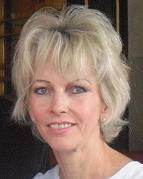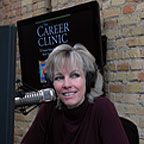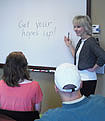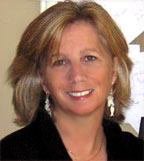aureen Anderson seemed to be well on the road to success when she graduated with a civil engineering degree. She worked in a variety of positions until the day she stopped to think about where her road was leading. Maureen changed directions and found true success in a job she loved! She started writing and penned several books, including her recently released The Career Clinic: Eight Simple Rules for Finding Work You Love. She also entered radio and now hosts a program called The Career Clinic. She’s always ready to counsel those looking for career answers, so let’s ask Maureen about success and how we can find ours!
***
WOW: Maureen, I’m so glad you’re here! Not only are you a successful woman, but you also help people every day to find personal success. Let’s start with you and your journey. Civil engineering is worlds apart from writing and radio! What drew you to that course of study?
Maureen: Money. I was good in math, okay in science, and I wanted the highest starting salary I could get when I graduated.
WOW: So, you wanted to make money. That seems like a good plan! Of course, the next question has to be, did you? What kinds of work did you find?
Maureen: I never worked in engineering after I got my degree. I hated my engineering classes. I had three summer internships while I was still in school: one in road construction, one in railroad design, and one in manufacturing management. The internships were a lot of fun in every way except the actual work. So I knew by the time I graduated, I wanted nothing to do with engineering.
Instead I went into a general management program with a big company; and while the work didn’t exactly make my heart sing, I learned a lot about what I was good at and what might be fun to focus on someday.
WOW: Still, it was gainful employment, which is another good plan. What happened to make you want a career change? And was it hard to walk away from the career where you’d invested so much already?
Maureen: I got a divorce, which I hadn’t seen coming. I was between jobs at the time and decided I may as well start over on everything. I wasn’t really walking away from anything, so I can’t take any credit for having much in the way of courage.
WOW: I can see how a lifestyle change may have spurred you on to make other changes. But what led you to your next career? How did radio and writing come into the picture?
Maureen: I went to a two-week workshop given by Dick Bolles, author of What Color Is Your Parachute? One of the things Dick taught me was, “If you’re not having fun, you’re not doing it right.” I thought that was great advice about work and about life. Suddenly, I remembered what I had always known—that I wanted to have conversations and write stories for a living.

“I was thirty-four when I interned, so don’t let anyone tell you that you have to be a college kid to do that.”
WOW: Well, I have to agree with you. It is fun to write stories for a living! But I’m sure it wasn’t easy to make a major career change. How did you go about getting into those fields? And how did you get someone to hire you without any real experience?
Maureen: I was a waitress to pay my bills, which left days open to look for a job in radio. I found one fairly quickly, selling ads for a station in St. Paul, Minnesota. I hated selling, but I loved working at a radio station. Eventually, I found out how to get an internship as a reporter. I spent six months as an intern for the Minnesota News Network, and that’s how I found my first paid radio job. I got hired to do news and host a talk show at a station in the small town where I still live. I was thirty-four when I interned, so don’t let anyone tell you that you have to be a college kid to do that.
WOW: That’s a good point about interning, Maureen. I guess you proved that there really are no shortcuts. You started small and worked your way up to your own radio program! Let’s talk a little about your program. What’s the one question callers always have?
Maureen: Most people I talk with don’t know where to begin if they’re contemplating a career change. Maybe they hate their job but have no idea what they want to do instead. Maybe they’re hooked on the salary or the health insurance, and quitting a so-called “sure thing” feels foolish. My guests on the program are the experts, not me. They usually reassure people they’ve taken a good first step—acknowledging their unhappiness. The next step is to figure out what would make you happy. The transition doesn’t have to be all at once. Career counselors rarely recommend that. You take a class; do part-time work on the side—whatever it takes to make sure this is something you really want to do. After that, it’s the old “one foot in front of the other” and never giving up.
WOW: Have you noticed a change in callers’ questions with the downturn of the economy and the lack of available jobs? Is it still possible to get a job you love?
Maureen: If anything, there’s some guilt for wanting to do work that’s fun, that’s meaningful. If you have a job and decide to quit, you may not get as much support from the people around you.
If you’ve just been laid off, it’s difficult to look at it as a good thing. But that’s what I hear over and over—recession or not. You’ve probably heard it, too: “Getting fired was the best thing that ever happened to me.” I think one reason is that it gives people time, which they’ve never taken before, to consider other choices.

“My favorite part of doing the talk show is the potential to mess up, believe it or not.”
WOW: Which brings us back to the choice you made. I started in radio myself, so I know it can be fun; but I know it can be intensely competitive. What’s your favorite aspect of your radio show?
Maureen: I noticed right away at the Minnesota News Network that no one was pulling me aside to tell me I was too intense. You were supposed to be intense. I was home. My favorite part of doing the talk show is the potential to mess up, believe it or not. It’s live, it’s showtime, and it’s up to me to make it worthwhile for people to listen for the whole hour.
WOW: If that’s your favorite part of radio, I can’t wait to hear what’s your biggest challenge!
Maureen: I’m still working on guest selection. Sometimes the most interesting people don’t sound interesting. It’s my job to catch that before we book them, of course, but I’ve made mistakes. And I haven’t perfected the art of taking a boring conversation and making it sparkle.
That’s rare, though. Usually the challenge is to make peace with how quickly the hour goes by because we’re sharing such useful information (if I do say so myself) and having so much fun. But that’s life. Fleeting.
“Home is where the dishwasher is.”
WOW: Just like this interview is flying by! I know you enjoy writing, also, and I want to ask you about that part of your career plan. How did you get started? Do you remember your first published credit?
Maureen: I do remember the first time I was published. It was a twenty-five words or less contest in the magazine Good Housekeeping. You were supposed to say where you wanted to go home for the holidays and why. “I want to go back to Minnesota,” I wrote, “because (the twenty-five words started here) my new husband has never looked out the window of a Mary Tyler Moore house and watched kids playing hockey on a frozen neighborhood lake.”
I didn’t win the grand prize (a trip back home), but I did win a dishwasher. And as a friend pointed out, home is where the dishwasher is. I had so much fun putting that sentence together! You could have your dishwasher and the home that went with it. I just wanted to keep writing.
The friend I just mentioned taught a freelance writing course, which I took to keep myself from going crazy with boredom on one of my corporate incarnations. After I turned in my first assignment, he asked me to be a research assistant on his first book; and that internship taught me a lot about how to get a book into print. I used what I learned from him to sell my first two books to a publisher.
WOW: You must be a quick learner because you’ve just released your third book! What’s the story behind the book, The Career Clinic: Eight Simple Rules for Finding Work You Love? How about some details of that publication journey?
Maureen: I’d been doing The Career Clinic radio vignette for a few years when I thought that a collection of my favorite stories would make a really good book or at least, one that I would want to read. I found an agent who, after several tries, told me she’d have better luck selling the book proposal if the radio show was a bigger deal. My husband, who’s also my producer and business partner, found someone who said he could help us make something of the radio show. But after about six months, that person came back to us and said, “What would really help is a book.”
That’s when I decided to go back and get a job in civil engineering (just kidding!). But I hung in and eventually found a publisher about the same time my husband talked the owner of a brand-new radio station into being our flagship for the talk show.
WOW: The road to publication is not often a straight path, is it? And what about those eight rules? How did you come up with those?
Maureen: I just sat down one day and asked myself what my favorite career changers had in common.
WOW: Sounds like the eight rules were the simplest part of the whole book. When I picked up your book for my recent college graduate (I already love my job!), I started reading, and I couldn’t put it down! I really enjoyed how everyday people, and not-so everyday people, shared anecdotes and experiences to support each rule. One of my favorite exercises was tied in to the choreographer, George Balanchine. Do you know the rule I mean?
Maureen: First of all, thanks. I love these questions! It’s from the rule, “Ask for Directions When You Get Lost.” And I love the exercise you’re talking about. I’ve used it in workshops. What is the one thing you have to do to be happy? Write it down. I have to ________ (fill in the blank). George Balanchine said he doesn’t hire people who want to dance. He hires people who have to dance. You’ve probably heard that advice about a writing career—to only pursue it if you have to because there are easier ways to make a living.
“When she was so hysterical she couldn’t even make a list, she scrubbed her bathroom. ‘It’s hard to worry really successfully when you’re cleaning,’ she said.”
WOW: Writing’s tough, all right, but at least I get to work in my pjs! That exercise was my fave, Maureen, but now I have to ask if you have a favorite story or two?
Maureen: My favorite story is about Malcolm Bryan, whose experience is shared in the rule, “Talk to Yourself.” He knew when he was twenty he wanted to be an artist but was told he couldn’t make a living at it. So he sold out, temporarily. He became a successful airfreight forwarder. But before he embarked on the life other people approved of, he made a promise to himself. No matter what he was doing at age forty-five, he would quit and become an oil painter. He kept that promise. Twenty-five years later! I can’t remember the last afternoon I finished something I set out to do only that morning. But Malcolm Bryan did, after twenty-five years, and he’s one of the happiest people I know.
Another favorite story is about a librarian in New York City whose health scare inspired her lifestyle change. It’s from the rule, “No Regrets.” Mary Jane Ballou moved to Florida and now plays the harp for a living. “It’s scary to overhaul your life,” she said. “And anyone who tells you it isn’t is a liar.” When Ballou got really afraid, she’d make a list of little things she could do to advance her dream: “Make one phone call, send two e-mails, whatever.” When she was so hysterical she couldn’t even make a list, she scrubbed her bathroom. “It’s hard to worry really successfully when you’re cleaning,” she said. Afterward, she was probably not one step closer to her dream: “But at least I had a clean bathroom.”
WOW: I remember those stories, and they’re truly inspiring! But as you mentioned, making a living as a writer is not the easiest career choice, especially for new writers who’d like to write what they love and get paid for it, too. What’s the best advice you can give our readers about following a writer’s career?
Maureen: Have another way to pay the bills until you get established. And maybe even after you are established if there is such a thing. Maybe some people would find it energizing to need to sell any one particular essay or article to have money to buy next week’s groceries, but I would find it paralyzing.
The “combo platter” approach to work is what works for me. My radio work keeps me inspired to write, and I frequently write about what I’ve been learning on the radio show.

“Don’t decide the best part of your life is behind you.”
WOW: I’ve never heard it called the “combo platter” approach, but I like it. And what’s your best “What Not To Do” when it comes to a writing career or any work that we love and would like to pursue?
Maureen: I just read something recently that haunted me. It was along the lines of how many of us give up on our dreams in our fifties.
My advice is don’t do that. Don’t give up on yourself—ever. Don’t decide the best part of your life is behind you. Maybe your story is only starting to get interesting. At least give yourself that chance.
WOW: Well, speaking as a woman on the fifty-side of the fence, I think that’s excellent advice! Besides your own terrific book, what’s on your bookshelf? What do you recommend to our readers if they’re looking to give themselves that chance at success?
Maureen: Two of my favorites are The War of Art by Steven Pressfield and Ignore Everybody by Hugh MacLeod.
And there’s always the gold standard, What Color Is Your Parachute? It never goes out of style. The author, Dick Bolles, taught me everything I’m still learning.
“I have to resell myself on my career path daily.”
WOW: I read What Color is Your Parachute? when I was fresh out of college, but I was so unsure of myself back then. I suppose I was afraid of making the wrong choice. Was there ever a time when you second-guessed your career change, wondered if you should have stayed in civil engineering, and had a nice, safe career?
Maureen: I have to resell myself on my career path daily because there’s a lot of uncertainty. But I don’t regret getting the heck out of engineering. Not for a moment. I hated it, and I was terrible at it. Anyone who knows me very well is thankful I didn’t design a bridge they drive over!
My husband sent me out to get a new oil filter for our car one day, and I almost burst into tears trying to make sense out of those charts. Before the Parachute workshop, I would have berated myself for that: “You have an engineering degree! You can’t figure out what oil filter to buy for your car?” Now I just think, “You have lots of skills. This isn’t one of them.”
WOW: I say the same thing when it comes to fixing dinner every night! Now, Maureen, I have one last question for you. You’ve written a terrific how-to book and host a popular radio program. Did you plan it all out, or do you wake up some days wondering how you ended up with this kind of success?
Maureen: Sorry, I can’t help laughing! Because no, I never wake up thinking that. Maybe it’s because there’s still a little bit of a gap between my income and my happiness if you get that drift. But I usually wake up very happy and excited to make something happen. And sometimes I do wonder how I got so lucky. I think I followed the eight simple rules before I knew what they were. I did it instinctively or accidentally. Then I found someone who believed in me, and I married him.
WOW: Follow Maureen Anderson’s radio program, The Career Clinic, as she interviews career experts and shares job-hunting advice and tips every day. Just check out her website at www.thecareerclinic.com for an affiliate in your area. And find out all the rules in her latest book, The Career Clinic: Eight Simple Rules for Finding Work You Love. Like Maureen, you can find your own true success. All you have to do is “Say Yes” (rule number six)!
***

Cathy C. Hall is happy to go to work every day, writing both fiction and non-fiction for adults and children. If you’d like to see how she makes her writing career work and pick up a few tips along the way, visit her at Cathy C.’s Hall of Fame (www.cathychall.blogspot.com). Dress is always blog-casual!